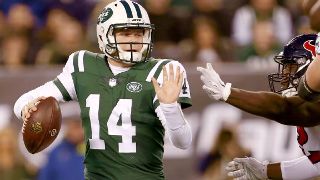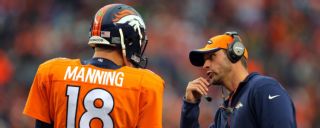|
Adam Gase was a 34-year-old quarterbacks coach, a relative unknown outside the NFL coaching fraternity. Peyton Manning was a 36-year-old legend, starting over in a new city with a surgically repaired neck after an injury that nearly ended his career. The year was 2012, the team was the Denver Broncos. They forged a professional relationship, which became a historically successful partnership, which turned into a friendship -- one that has defined Gase's coaching career. "It was unbelievable, the connection they had," said former Broncos wide receiver Eric Decker, who witnessed the first two years of Gase-Manning in Denver. Gase made Manning a better player (memo to skeptics: yes, really), and Manning made Gase a better coach, which should benefit the New York Jets -- specifically, Sam Darnold. Perhaps swayed by Manning's recommendation -- an 11th-hour call to CEO Christopher Johnson -- the Jets hired Gase to replace Todd Bowles, in large part because of his reputation as a quarterback whisperer. Cynics will say Manning didn't need any whispering, especially not from a coach two years his junior, but that's missing the big picture. Theirs was a unique relationship in that Gase learned just as much as Manning, maybe more. "Adam prospered a lot in that player-coach relationship, too," former Broncos coach John Fox said. "You learn a lot from players, how they see things and how you adjust." Manning was a walking computer chip with a hard-driving demand for perfection. He was so obsessed with game preparation that, while sitting out Wednesday practices in 2013 because of an ankle injury, he wore his helmet in the trainer's room so he could hear Gase's calls on the practice field. He soaked his ankle while listening to Gase and watching game film on a computer tablet. You think a player with that kind of maniacal work ethic would expect anything less from his coach? Not a chance. Gase always considered himself a film junkie, starting as a student assistant at Michigan State under Nick Saban, but he took it to a new level working with Manning, especially when he was promoted to offensive coordinator in 2013. It wasn't unusual for Manning to leave game plan-related questions for Gase at the end of each day, which required after-hours research into opponents' tendencies, pass coverages, blitz packages, etc. When the Broncos reached the Super Bowl after the 2013 season, Gase received late-night messages from Manning, who always craved more, more, more information. "He learned how to use the voice memo on his phone, which is awesome," Gase told author Gary Myers in an interview for Myers' book, "Brady vs. Manning." "Nothing like listening to a 15-minute voice memo from him at 10 o'clock at night." It was a 24/7 job, but it produced unprecedented results. That year, the Broncos annihilated the NFL record book, scoring 606 points with Gase creating the game plans and Manning executing them flawlessly. Manning threw for 55 touchdowns and 5,477 yards -- both NFL records -- eclipsing his personal bests by six TDs and 777 yards. Manning, arguably the most cerebral quarterback in history, would've played well if Kim Kardashian had been calling the plays, but facts are facts: Under Gase, he rose to a new level. "Everybody says, 'Oh, Peyton Manning, anybody can coach him' -- not really true," Fox said. "All quarterbacks want answers. They'll understand the basic read, they'll understand daily drills as far as mechanics and fundamentals, but what they really want are answers. What is this? What is that? Peyton, that was big with him. Adam did a fantastic job of giving him answers." What does this mean for Darnold? He'd better be ready to grind. His new coach witnessed quarterback play at its highest level, and he will be demanding of Darnold even though it's unrealistic to expect a second-year player to approach Manning '13 -- or for any player to approach that, for that matter. You can bet there will be Peyton references in their meetings, maybe some video cut-ups of vintage Manning. Gase also didn't rule out the possibility of inviting his former pupil (mentor?) to camp in an advisory role. Fortunately for Gase, Darnold already has a gym-rat mentality. When he missed three games with a foot injury, he attended every practice, eavesdropping on the quarterback-coordinator communication. It will be interesting to see how Darnold's laid-back personality meshes with Gase's intensity. One can only wonder how long it'll be before Darnold is barking "Omaha!" at the line. "He'll help Sam fundamentally," Fox said of his former assistant. "He'll help him for sure. The thing about Sam is, he'll get a clean slate. I think it's just digging in and taking it as far as he can. I don't know that it will happen in the first year, because it's an extensive playbook. It depends on how far you can take it at the line of scrimmage." That's where Manning separated himself from mortal quarterbacks -- and it's where Darnold needs the most work.  Manning was a chess master at the line because of his ability to change plays and operate an up-tempo, no-huddle offense. He was so good, Fox said, that it became "uncomfortable" to huddle. Know this: Manning had Gase in his ear, providing options and alerts, until the radio shut off at the 15-second mark on the play clock. It'll be the same dynamic with the Jets: Gase calling in plays to Darnold. Manning was a chess master at the line because of his ability to change plays and operate an up-tempo, no-huddle offense. He was so good, Fox said, that it became "uncomfortable" to huddle. Know this: Manning had Gase in his ear, providing options and alerts, until the radio shut off at the 15-second mark on the play clock. It'll be the same dynamic with the Jets: Gase calling in plays to Darnold.
"They worked so well together," Decker said of the Denver duo. "Peyton was a coach on the field, the way he made checks, the way he demanded things of his teammates. Adam was the brains. They worked together to formulate a plan, with adjustments to certain concepts. As a young coach, it's nice to have someone so seasoned like Peyton because you're able to execute things like that. It was pretty cool to be part of it." Gase wasn't intimidated by Manning, according to Decker, who said they "gave each other crap" in a typical guys-will-be-guys kind of way. Manning was serious, though, when he pressed Gase to up his game in regard to offensive line calls. Gase came up as a skill-position coach -- receivers and quarterbacks -- so he was no expert on what takes place in the trenches. Manning took care of that, teaching him protection schemes and how to combat specific defensive line movements. Again, this wasn't your typical coach-player situation; it was more like peer-peer, Gase said. "I think his relationship with Peyton really helped him deal with the overall essence of what the defensive line was doing," said Decker, who caught 11 touchdowns in what he called a "magical" 2013 season. Manning once described Gase as "innovative, creative, aggressive -- a guy who just works all the time to put us in a position to succeed." Gase is appreciative of his bond with Manning, once remarking, "This guy basically changed my career, the way that he made me think about the game." It put Gase on the coaching map, for sure. In 2015, he followed Fox to the Chicago Bears, serving as the coordinator for one season before landing the head coach gig with the Miami Dolphins. Gase and Manning have remained close. In his final days as the Dolphins' coach, Gase confided to Manning that he sensed a looming ax. They immediately began plotting potential next moves. Manning reportedly called the Cleveland Browns to recommend Gase for their head coach vacancy, but he didn't get an interview. After being hired by the Jets, Gase reflected on his time with the future Hall of Famer. "When we first met each other, it was who was going to be the first one to break, who was going to outwork who," he said. "He appreciates that. He appreciates hard work. He appreciates somebody who's going to go nose-to-nose with him and try to challenge each other. That's something I enjoyed, that constant challenge, knowing that every day you better have your plan ready." Gase was relating what he learned from Manning, but he might as well have been talking to his new quarterback.
|

